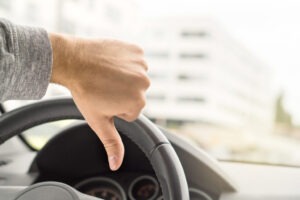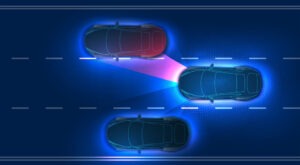
Road Rage Causes Serious Situations that Can Lead to Serious Injuries
Aggressive behavior on Florida’s roadways causes accidents that are often catastrophic to drivers and passengers alike, usually because these accidents tend to occur at high speeds. To prevent and punish drivers for this dangerous and careless behavior, Florida has a road rage statute that defines and punishes road rage, otherwise referred to as aggressive careless driving.
If you or your family were injured by someone who drove aggressively and carelessly, seek the help of an experienced car accident attorney in Fort Myers to ensure that you get the compensation you deserve to fix the damages and injuries that the careless and negligent driver created.
What is the definition of road rage?
Florida law defines road rage (also known as aggressive careless driving) as committing two or more of these acts at the same time or in succession:
- Speeding;
- Improperly changing lanes;
- Tailgating;
- Not yielding the right-of-way;
- Improperly passing another vehicle;
- Ignoring traffic control devices.
Drivers who violate the road rage law can face: fines, incarceration, suspension of their driving privileges, and having points levied against their licenses, among other potential penalties.
Road raged drivers also face potential civil liability for damages to anyone their behavior injures. Most likely, this occurs when an angered driver is driving aggressively, causing a car accident and injuring the driver or passengers of the other vehicle.
What causes road rage?
It’s easy to get fed up behind the wheel. We all live lives impacted by stress and anxiety at times. When traffic conditions and that overwhelming fear of being late to something heap additional strain on our shoulders, our emotions can get the best of us.
There is no single factor that causes a person to lose control of their anger behind the wheel, but some conditions make road rage incidents more likely.
According to the Insurance Information Institute, the following situations can cause road rage:
- traffic backups
- the prospect of arriving late to an important meeting or appointment
- another driver’s actions, intentional or accidental
- hazardous road conditions, like intense rain
These situations can cause them to see other drivers’ actions through a highly-emotional lens, according to researchers. They interpret other motorists’ ordinary driving decisions or carelessness as actions requiring a violent or aggressive response.
Those Prone to Anger Tend to Bring that Emotion to the Roads
Those who have difficulty controlling their anger or emotions in other parts of their lives may also tend to be particularly vulnerable to episodes of road rage. Historically, men were considered to be more prone to road-raging than women, but according to another expert, the behavior is now prevalent among drivers of all genders.
Finally, road rage can result from our primitive reaction to witnessing dangerous driving behaviors. When we witness an action by another motorist that we consider dangerous to ourselves, our passengers, or others around us, our “fight or flight” instinct can prompt us to take aggressive action to “punish” that dangerous behavior. Ironically, this instinct may result in us putting more people in danger than the behavior that prompted our aggressive response.
What to Do If You Encounter an Aggressive Driver
If you encounter an aggressive driver on the road, take these steps to avoid an accident or violent encounter.
- Get away from the aggressive driver. You may have to slow down to let him or her get farther in front of you or let the driver pass you.
- Do not engage with the driver. If the driver makes an obscene gesture or is otherwise rude, ignore it. Reacting to the aggressive driver could dangerously escalate the situation. Keep your eyes on the road ahead.
- If an aggressive driver follows you, tailgates you, or makes aggressive movements seemingly intended to “run you off the road,” make sure your doors are locked and either drive to the nearest police or fire station or call 911. Whatever you do, do not stop to confront the driver.
- If possible, get a description of the vehicle and the license plate number so that you can report the driver to the police.
Expect More, Receive More: Legal Support That Feels Like Family
Don’t Be an Aggressive Driver and Start a Road Rage Incident
If you know you have a temper, you can help yourself stay out of trouble by leaving a little early to get to your destination in the event of a traffic jam, and by practicing techniques (such as deep breathing) to help you keep your emotions in check. Keep in mind that most drivers do not try to annoy you on purpose. A slow driver might be lost, or have missed a turn, or be unable to see because of glare from the sun or a heavy downpour.
Resist the urge to react angrily to someone else’s mistake (or, frankly, stupidity). Flipping-off another motorist or honking your horn aggressively could incite anger in the other driver.
Use Your Horn Appropriately, and not as Tonal Cuss Out
Of course, that doesn’t mean you should stop using your horn altogether. If someone cuts you off or pulls out in front of you from a driveway or side road, a short blast will warn them to get out of the way, especially if you can’t slow down fast enough to avoid an accident. But blasting your horn in traffic accomplishes nothing except to fray your own and other peoples’ nerves.
Tailgating and Flashing Your Lights is Dangerous and Stupid
Likewise, never tailgate someone. If the person you are tailgating has to stop quickly, you’ll probably end up getting into a collision and receiving a traffic citation.
Another sign of impatience is flashing your lights at the vehicle in front of you. This is rarely necessary, and it could incite the motorist in front of you. Of course, if you need someone to move out of the left lane you might give a quick flash of your headlights to signal them that you are there, but keep in mind that speeding is one of the components of aggressive driving. You can almost always tell if someone knows you are behind them as the person will glance in the rearview mirror.
Finally, if you are on the highway and trucks are around, especially on an incline, someone may flash a truck driver to let him or her know it is okay to change lanes in front of them. If you are farther ahead, you will likely see the lights flash—keep in mind that they’re not always meant to annoy you, especially if you are several car lengths ahead of the person flashing the lights.
The bottom line is that being respectful and defensive will keep you safe on the road. Do not take the bait of someone acting aggressively toward you, and do not let your anger take control. An accident resulting from road rage solves nothing.
I was in an accident caused by road rage, what should I do?
As in any type of car accident, your first priority should be your own health and safety, and that of your passengers. In road rage incidents, risks to your wellbeing come not just from the impact of the accident itself, but also from the behavior of the road-raging driver who caused it.
After you’re in a car accident, if you can, call the police immediately after a road rage accident. If the other person is still irate and out of his vehicle, then, if you can, remain in your vehicle with the doors locked.
If the other person has calmed down, take pictures of the accident scene from all angles. Do not tell the other person it was his fault or further aggravate him. If the other driver will give you his contact and insurance information, get it as you would in any other accident. If not, then write down his license plate or take a picture of it.
If the person leaves the scene of the accident, the police will be able to track him or her via the registration.
If there are witnesses, be sure to get their information. The police will get the information, too, but it can help to have the information for your attorney before you can get a copy of the police report.
When the police arrive, let them know that the other person was driving erratically and what you saw the other person was doing. If the aggressive driver ran you off the road, be sure to let the police know. The aggressive driver may face criminal charges because of that behavior. As always, take pictures, even if the person who caused the accident drove off. If possible, take pictures of the person driving off.
Documenting the Road Rage Accident
As soon as possible, document the accident. Write down what you remember. If you were able to take pictures, add copies of the pictures to your file. The sooner you write down the events that led up to the accident, the more you will probably remember.
Additionally, keep a journal of your injuries, how they are healing and how much pain you are in every day. Should any of those injuries require additional medical care, the journal will help the attorney determine a time frame for healing if an injury looks like it is going to be long term or even permanent.
Types of Injuries Caused by Road Rage Accidents
Road rage accidents often occur at high speed, resulting in different types of severe injuries. Injuries suffered in a road rage accident may include:
- Bumps, bruises, scrapes, cuts, and abrasions: These may heal quickly unless you have underlying conditions that prevent it, such as diabetes or a compromised immune system.
- Sprains, strains, and pulled or torn muscles: These types of injuries could take a few weeks or a few months to heal. If you need surgery to repair a torn muscle or other soft-tissue injuries, the physical therapy could take several months to finish.
- Fractures: Many types of fractures that don’t break the skin exist. Some may or may not need surgery to repair. While fractures do not usually get infected, the surgical site could become infected, causing the healing process to slow.
- Compound fractures: A compound fracture is when the bone breaks the skin. The open wound, like any other open wound, could become infected. A compound fracture may take longer to heal than some other types of fractures.
- Head and brain injuries: These injuries could be minor enough to heal rather quickly or they could be catastrophic enough to last longer or even cause problems later in life. Concussions are tied to chronic traumatic encephalopathy (CTE) which could appear many years after you recover from the concussion.
- Back, neck and shoulder injuries: As with head and brain injuries, these could be minor enough for you to recover quickly or may be catastrophic, lasting long term or even permanently.
- Secondary injuries: You may also suffer from additional issues such as an amputation or paralysis as a result of injuries sustained in a road rage accident. You may be entitled to damages for these secondary injuries, especially if they impact you for the long term or the rest of your life.
Damages you may be entitled to after a Road Rage Accident
If you are injured in a road rage accident or you lost a loved one because of a road rage accident, you may be entitled to compensation for your losses. Available damages can include special, general and punitive damages.
What are Special Damages?
Economic damages compensate you for the out-of-pocket costs of an accident. They may include:
- Medical expenses;
- Lost wages;
- The replacement or repair of damaged property;
- Future medical expenses; and
- Future lost wages.
What are General Damages?
Non-economic damages are compensation for harm you suffered that does not have a fixed dollar amount associated with it. They may include:
- Pain and suffering;
- Loss of companionship;
- Loss of consortium (unable to have a physical relationship with your spouse);
- Loss of use of a limb;
- Compensation for being paralyzed; and
- Inconvenience, if you are not able to take care of your home and must pay someone to do things you normally would do yourself, such as cleaning, cooking, mowing, and home maintenance.
General damages are usually awarded if your injuries are expected to be long-term or permanent.
What are Punitive Damages?
It is rare for a plaintiff to receive punitive damages. If the defendant’s actions or inactions are grossly negligent or intended to harm you or someone in your vehicle, you could be entitled to punitive damages. You might receive punitive damages if the defendant was driving under the influence or because the defendant caused a road rage accident by hitting your vehicle on purpose or his or her actions were intentionally harassing and those actions caused the accident.
Were you involved in a Florida road rage accident?
If you were injured in an accident caused by road rage or an aggressive driver, call an experienced car accident lawyer who offers a free consultation. We are happy to help you understand your rights and options and get you on your way back to living a whole and complete life again.






